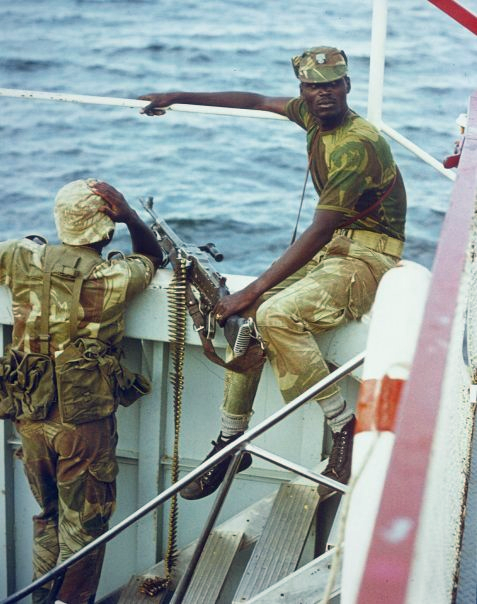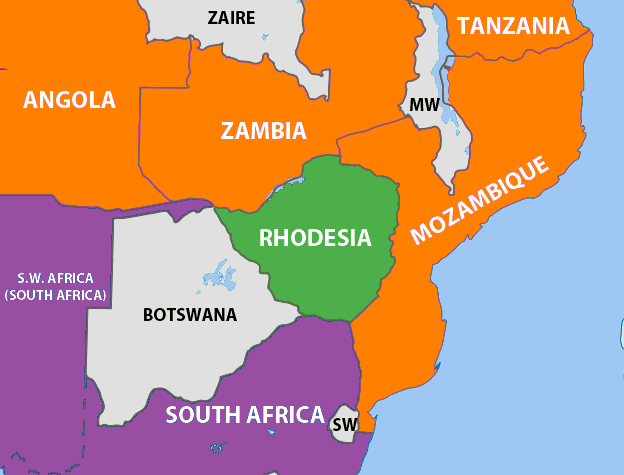The Rhodesian Bush War (1964-1979)

Rhodesian Troops in Lake Kariba 1976. (Creative Commons photo. Attribution to author and info can be found here)
This civil war in Rhodesia (now called Zimbabwe) would be a fight between the white majority government in the country against two seperate African majority groups who were fighting for majority rule in Rhodesia. When the British decided to leave the country they refused to allow official independence to the country without adding voting rights for the people, however, the ruling group of Europeans declared independence anyway and ignored the British completely. This allowed them to tailor their country as they saw fit, but also made other countries refuse to give them formal recognition as an independent country. The remnants of the colonial system was kept in place due to this shift as the European minority kept the most fertile land for themselves and Africans were crowded into land that wasn’t very good. European Rhodesians, on the other hand, felt as if their culture was under attack and things were changing far too fast for their comfort.
The earliest signs of an independence movement was a civil disobedience campaign that was centered around the wealth disparities among the people. The specific trigger was rising bus fares in the country that would affect all of the poorer Rhodesians. The people already paid up to 30% of their pay on transportation and an increase of this would be hard to swallow for the poorest among them. The bus company would back off pretty quickly due to such a huge boycott, which gave the people hope that they had the power to create change.
The rebels would start with the assassination of a government official, which the government would use as justification to jailing all the rebels from any rebel group. The problem was that many of the rebels had fled to other countries so the government attacked some of the neighboring countries to try to get these people also. The government did struggle trying to fight this war though, largely due to the fact that no one would trade with them until they were recognized by Britain. The reaction that the government gave to
the assassination actually ended up unifying the rebel movements into one “black nationalist” group, which increased their effectiveness by leaps and bounds. The government would respond to this new group by a wave of bombings of the rebel bases in both Rhodesia and other countries. The stories of these bombings were often told quite differently depending on who was telling the story. For instance, at one point a rebel camp was bombed where the government claimed they had killed 1,000 people during a military parade in the camp. The rebels, however, claimed that this was actually a refugee camp and all who were killed were innocent people. Either way, this action caused the rebels to grow bolder and start allowing civilian deaths in this battle. They received a ton of help from the Soviet Union and started shooting surface to air missiles at passenger planes to take them down.
The rebel groups would hold out long enough that the government realized the idea of winning a true military victory against this movement was unlikely. Many of their white citizens were fleeing the country to get away from the violence and at the same time the UN condemned them as an “illegal racist minority regime.” Not everyone was against them during this time though, the British Prime Minister claimed that the rebels were terrorists and the government was doing what they had to do. It was clear that they couldn’t keep voting rights from the rebels long term with no support from other countries, so they started to contemplate what steps to take next. They started to push a propaganda campaign to win the hearts and minds of the African citizens, while at the same time they brought in moderate leaders to help work out the details of peace.
These meetings would result in the creation of a brand new country of ‘Zimbabwe-Rhodesia’ in 1978. This decision led the international community to lift the sanctions that had been hurting the country for years. In the first election the majority would elect the moderate African Bishop Abel Muzorewa, but his popularity would fall quickly because he was seen as a puppet for the white population. Robert Mugabe won the Prime Minister position by winning 63% of the vote. This was such a high majority that many people believe he must have intimidated voters to get it done.

Map of the region with Rhodesia in Green, government allies in Purple, and Nationalist allies in Orange. (Creative Commons photo. Attribution to author and info can be found here)
